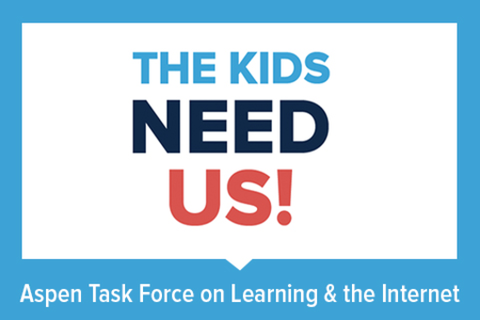Report of the Task Force on Learning and the Internet
Today, the non-partisan Aspen Institute Task Force on Learning and the Internet is issuing its report, Learner at the Center of a Networked World, based on a year’s worth of deliberations, research, and outreach (a live webcast of the event can be viewed at 3:30pm ET today at: http://www.aspeninstitute.org/events/live). The 100+ page report offers a wealth of observations, perspectives, and suggested action steps for a broad range of stakeholders interested in leveraging technology for learning. The six primary recommendations of the Task Force include:
 Redesigning learning environments to empower learners to learn at any time, any place, and at any pace, both in school and beyond, including by funding research and development initiatives, disseminating best practices, and conducting research on student outcomes.
Redesigning learning environments to empower learners to learn at any time, any place, and at any pace, both in school and beyond, including by funding research and development initiatives, disseminating best practices, and conducting research on student outcomes.- Enhancing the ability of educators to support and guide learners in a networked learning environment, including by aligning educator preparation and support mechanisms, leveraging the opportunity of open educational resources (OER), and re-evaluating teacher-/school-quality policies.
- Building an infrastructure that will connect all students in all of the places they learn, including access by all learners to robust broadband networks and learning devices designed to meet the needs of all learners.
- Supporting the maximum feasible degree of interoperability across learning networks, by promoting open technical standards and requiring their use as a condition of funding.
- Adopting policies to incorporate digital media and social-emotional literacies as basic skills for living and learning in the digital age, including by ensuring that educators, students, and parents are offered meaningful opportunities to acquire the skills, knowledge, and abilities they need to effectively take advantage of digital learning opportunities.
- Creating trusted learning environments for learning, including by conducting research, evaluating existing federal and state laws, and fostering collaborative efforts to address student data privacy and agency for digital learning.
Among many other stakeholders, SETDA contributed to the Task Force’s deliberations and is pleased to see many of our recent priorities reflected in their ideas. For instance, SETDA and its members have championed equity of access to high-capacity broadband for learning both in and out of school, the important roles for digital content and OER in learning, and have advocated for more attention to interoperability efforts to ensure that education data are used in the service of learning. The trends identified in this report are significant, the issues it raises are critical, and the recommendations important.
We congratulate the Task Force on its report and are pleased to pledge our support to work with all those committed to advancing the recommendations they have issued.
